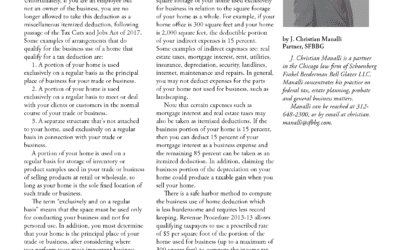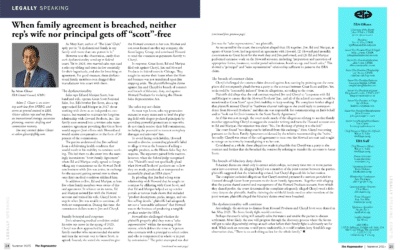Schemes involving lawyers improperly compensating non-lawyer referral sources are all too common and are frequently brought to light in the form of professional disciplinary actions. Far less common are reports of illegal referrals involving physicians and hospitals.
Yet, two federal decisions involving physicians accused of taking illegal kickbacks in exchange for referring patients were just handed down. In successive months, the 7th U.S. Circuit Court of Appeals affirmed the conviction of a doctor working at a Chicago hospital, while a U.S. District Court dismissed civil charges against some suburban doctors.
In a well-publicized indictment, some 11 physicians and administrators at Sacred Heart Hospital were charged in March 2014 with participating in an illegal kickback scheme.
One was podiatrist Shanin Moshiri, who signed a “teaching contract” with Sacred Heart in 2006 after the hospital’s owner expressed interest in attracting more podiatry patients. Moshiri went to trial in 2015 in the Chicago federal court on charges of taking kickbacks after referring such patients.
At the trial, the director of the podiatry residency program, Dr. William Noorlag, related how the hospital owner had approached him to begin offering paid “teaching contracts” to podiatrists, which he understood as code for paying $2,000 per month for patient referrals. Sacred Heart podiatrists had always taught residents without contracts and Noorlag viewed the contracts as unnecessary.
Moshiri nonetheless signed just such a teaching contract and after two years the hospital doubled his rate to $4,000 per month, putting him ahead of Noorlag, who earned only $40,000 annually. A testifying expert called by the government at trial opined how teaching stipends typically averaged between $200 and $4,000 per year, and that it was unheard of for podiatric residency programs to pay as much as $2,000 a month.
Multiple witnesses testified that Moshiri performed little work under his teaching contract and certainly spent less time between 2006 and 2013 with residents than other program podiatrists. During this same period, hospital logs showed he performed more surgeries than any other attending podiatrist and billed Medicare and Medicaid nearly $500,000.
This level of activity drew attention from federal law enforcement agents, who quickly secured the cooperation of Sacred Heart’s COO — in the form of wearing a wire. Moshiri was recorded offering to bring a list of his referred patients when picking up his check from the hospital owner and bragging about his proficiency for attracting podiatric patients to Sacred Heart.
Arrested soon after, Moshiri received his Miranda rights and then reportedly admitted to a FBI special agent that his teaching contract “turned into basically paying for patients.” He was charged with three counts of violating the federal Anti-Kickback Statute and convicted of one.
On appeal, Moshiri contested the sufficiency of the government’s evidence that his arrangement with the hospital involved “the volume or value of any referrals,” conduct specifically prohibited by the Anti-Kickback Statute.
The 7th Circuit readily found that patient referrals comprised part of his arrangement based upon: The doctor’s offering to bring his list of referrals when picking up his check, his later asking if the hospital owner was happy with that list, his admission that the relationship at Sacred Heart had become one of payment for patient referrals, the evidence showing he did less teaching than other physicians who did not sign teaching contracts and the evidence that he did not otherwise perform his contractual duties.
The government also had to prove he knowingly violated the statute, and the court found his admission upon arrest and on the COO’s wire amply demonstrated knowledge. The conviction was unanimously affirmed. United States v. Moshiri, No. 16-1126 (7th Cir., June 5, 2017).
Meanwhile, in a case decided a few weeks earlier, an outfit known as Suburban Home Physicians Inc. doing business as Doctors at Home, together with several physicians and others associated with it, stood accused of violating the same Anti-Kickback Statute, but these charges came in the form of a qui tam (or whistleblower) action in Chicago’s federal district court. U.S. ex rel. Young v. Suburban Home Physicians, No. 14-cv-02793 (N.D. Ill., May 15, 2017).
The action was brought by former employees of Doctors at Home who alleged the defendants falsified Medicare forms in order to receive reciprocal patient referrals.
This civil case ended in remarkably different fashion.
Several of the physician defendants moved to dismiss the claims, prompting U.S. District Judge John Robert Blakey to set out the four-part standard, which must be pleaded with particularity, to state a claim under the Anti-Kickback Statute: “that the defendant: (1) knowingly and willfully; (2) offered, paid, solicited or received; (3) remuneration; (4) in return for purchasing or ordering any item or service for which payment may be made under a federal health-care program.”
However, instead of isolating the defendants who allegedly made payments or referrals, the qui tam claimants or “relators” lumped various groups of defendants together as the “Doctor at Home Defendants,” a designation that did “not identify who, specifically, engaged in the ostensibly fraudulent referrals.”
Other defendant groupings were made without distinction to enable the court to unravel who was charged with receiving or referring which patients and who allegedly submitted improper forms to Medicare.
Still other defendants were accused, like in the Moshiri case, of improperly cross-referring patients — here to perform services reimbursable by Medicare. The complaint alleged dates when certain patients were referred by “Doctor at Home Defendants,” but neither “enumerat[ed] the responsible parties with particularity,” nor pleaded what the defendants offered or paid to Doctors at Home in exchange for patient referrals.
The relators’ use of overly broad language “robbed their allegations of the plausibility and particularity required,” essentially leaving the court unable to determine who was charged with what. Blakey’s dismissal of these Anti-Kickback Statute allegations followed.
Unscrupulous attorneys should find no solace in these cases, but if the last two months are any indication, it appears they have not cornered the professional market on making improper referrals.
To view this article as published in the Chicago Daily Law Bulletin, click here.



